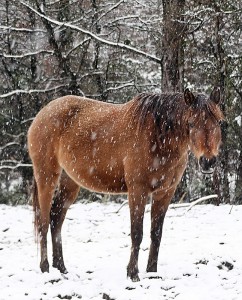 I read a lot of horse magazines, and they’re always full of good ideas for my horses. Growing up on a horse ranch, you would think a girl would know pretty much everything about horse care simply from association. But if there’s anything I’ve learned, it’s that things are constantly changing and there’s always something new to learn. So I thought I’d pass along a few of the winter horse care tips I’ve been reading about.
I read a lot of horse magazines, and they’re always full of good ideas for my horses. Growing up on a horse ranch, you would think a girl would know pretty much everything about horse care simply from association. But if there’s anything I’ve learned, it’s that things are constantly changing and there’s always something new to learn. So I thought I’d pass along a few of the winter horse care tips I’ve been reading about.
Water supply is my biggest worry during the winter. It’s a proven fact that horses drink less if their water is cold, which can result in health issues such as colic or other digestion problems. When I was growing up, we always figured it was all good if the ice was chopped and the horses had a ten inch hole of clear water in the tank that they could drink from. During summer months, my horses drink from a stream that flows through their pasture, and it stays open most of the winter if the water level is high enough. But knowing that they could colic simply because they don’t want to drink cold water makes me go the extra mile, hauling water in a poly tank in the back of my pickup to a water tank for them, put in a tank heater and cover the tank partially with plywood to keep the water drinkable. The peace of mind is worth the trouble.
Another problem in the winter is snowy conditions for outdoor riding. Horse’s hooves can ball up with ice and make it difficult or even painful for them to walk. I’ve heard of several remedies for this, such as using Vaseline or cooking spray on the bottom of your horse’s hooves before riding to keep the snow from sticking. I normally wouldn’t go to those measures, but simply make sure that my horse’s hooves are trimmed evenly so they don’t hold in the snow as badly, and just pick them out good before and after riding.
Winter brings with it harsh weather and the tendency for a horse to lose flesh and thin down during the colder months. During this time, I always boost their grain rations, and make sure I am feeding hay at least twice a day. My horses live outdoors with just a run-in shelter to protect them from the elements, so they need the constant presence of fermenting hay in their bellies to keep them warm. If a horse isn’t eating or digesting, his body temperature drops considerably. Free choice hay is the best option, especially if the temperatures are below 5 degrees, because it keeps the horse’s digestive system constantly working, which generates heat to warm the horse no matter how cold it is.
Another important ingredient during winter is salt. A horse needs sodium chloride in order to keep from becoming dehydrated. Not feeding enough salt can result in your horse becoming impacted or not having proper circulation. Salt can help a horse feel the desire to drink more water. I like to put salt blocks in for my horses, but you also can add a couple of tablespoons per day to the horse’s grain.
I don’t stress a lot about my horses, and they aren’t pampered, blanketed, or fed every supplement available. They are pretty happy just being horses and more often than not just spend their days eating. But these are just some of my winter-time worries that I see to in order to keep them happy and healthy.


{ 1 comment }
I am from Michigan and my horse is kept outside. Since I just got her, I am debating whether or not to stall her for the winter. I think she would be perfectly happy outside (I have been told that she never was stalled), and since she is a hardy Haflinger, she should be fine this winter. She does have access to a shelter and there is another horse that is kept with her. I also plan on not blanketing her, unless it becomes sub zero, very windy, or wet out.
After reading this, I plan on checking with my barn to see what she does for the water in the winter. I know she allows heated water buckets inside. I also will tell her to provide more hay in the winter so she can stay warm.